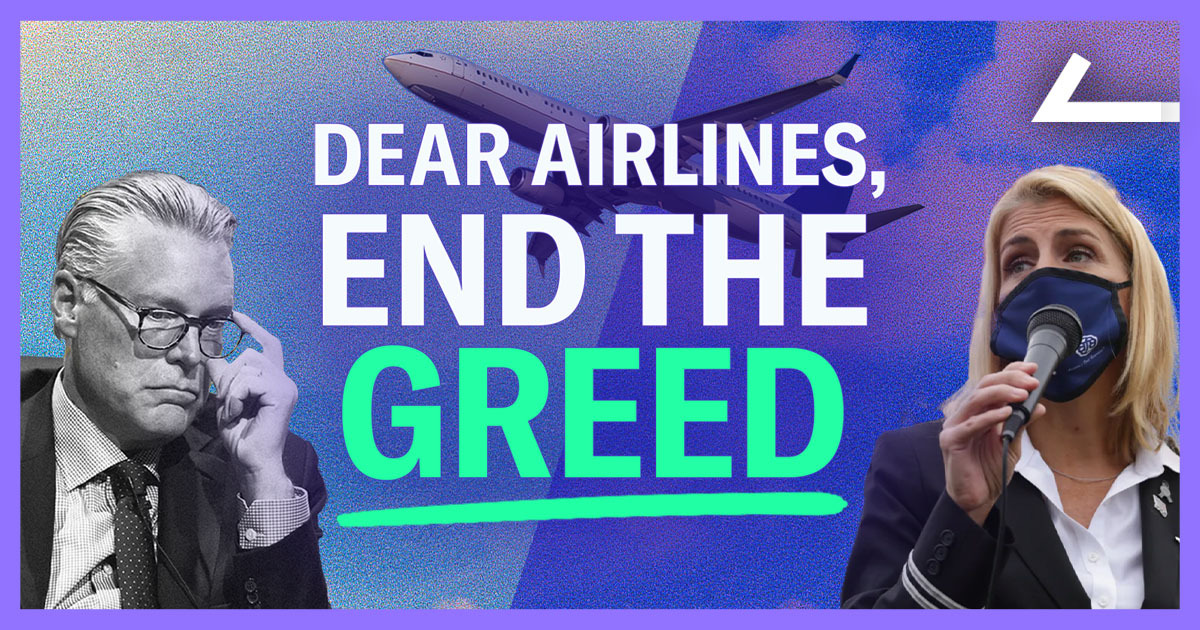Produced and edited by Joshua Miller-Lewis, Nico Pitney, and Josh Hirschfeld-Kroen
Airlines are set to spend billions on new stock buybacks — despite mass flight cancellations & understaffing. Congress banned the practice in 2020 after U.S. airlines spent $47 billion on buybacks last decade. Now the ban is about to expire. We spoke with Sara Nelson from the Association of Flight Attendants. Below is a full transcript of the video.
Sara Nelson: We essentially put the greed on hold for a little while. We stopped the airlines from doing the very worst, from laying everyone off, allowing the entire system to crumble. But that was really only freezing an imperfect system. We have to get back now to fixing it.
[News clip]: Chaos escalated at airports across the country.
[News clip]: A record number of Americans are on the move, despite the pandemic aftershocks, and staff shortages.
Sara: We have an opportunity right now to set some expectations of airline CEOs and airline investors that not one dollar should go in stock buybacks, not one dollar should go in increasing executive pay. Until they fix the operational issues that are out there. Until they staff the airlines with enough people to meet the demand of the American public.
[News clip]: The coronavirus effect has been fast and devastating for the airlines.
Sara: In March of 2020, the airline industry was about to collapse. 97 percent of the demand fell overnight.
[News interview with Sarah Nelson]: If we don’t step in, and make sure that the paychecks can continue for the people on the frontlines, the airlines will not be able to bounce back.
[News clip]: The airline industry alone seeking a 50 billion dollar bailout. But should these companies get relief with no strings attached?
Sara: We knew that in this crisis, we could take control. And we could set the terms for how things were going to work.
[News interview with Sara Nelson]: We can no longer have corporate bailouts. We need relief packages that are for the frontline workers. For the first time in history we’ll be telling corporations how to spend that money.
Sara: We put together a plan that was called the payroll support plan. It meant that any money that came from the federal government could only go to keeping workers in their jobs, to paying our paychecks, contributions to our healthcare. We have to ban stock buybacks. We have to set a cap on executive compensation so that we could change their behavior.
[News clip]: The industry as a whole has been dinged a couple of times because of the amount of cash they spend on buybacks over the decade.
Sara: Spent all that money, and how did they pay for it? They paid for it with more cuts from workers, making us work harder for less, even though they were making billions in profits.
[News clip]: Only to believe billions in aid when an emergency came along. Longer term, will the industry look at buybacks differently?
[News clip]: I think Southwest is a great example where it works. When we did use buybacks we used them appropriately.
Sara: A stock buyback is essentially giving money to the shareholders to inflate the share price. They’re taking profits out of the company, profits that are generated by the workers on the frontlines, by the way. They’re not investing that in the infrastructure of the company, they’re not investing in the frontline workers to have enough staff, and be able to respond to the demand.
Instead, those stock buybacks inflate the stock price, not because the business is doing well. And it incentivizes investors to invest more because they’re gonna take more of the profit out of the company. That’s all stock buybacks are. They’re complete and total bullshit.
[Reporter, asking Donald Trump at the White House]: Will you guarantee that the 10s of billions of dollars that’s gonna go to these industries will not go to executive bonuses or to more stock buybacks?
[Donald Trump at the White House]: It takes many many people in this case to tango. But as far as I’m concerned, conditions like that would be ok with me.
Sara: Remember that Mitch Mcconnell was in charge of the senate, and Donald Trump was in the White House. And the only way that we got this through is because we demanded it with 80% union, and got the airlines to agree to our framework, and then we went together and got bipartisan support for that.
[News clip]: Airline executives did not get the bailout that they wanted from the American taxpayer. The airlines got the version of assistance that Sarah Nelson wanted them to get.
Sara: It was one of the most successful programs of covid relief. More of the money from covid relief went to people on the frontlines than any other program, by twice at least.
Congress needs to take a hard look at what we were able to accomplish with banning stock buybacks and dividends for this short period of time and how that changed some of the behavior. They actually were forced to work on the business, they were forced to work on the operation.
How much worse is it gonna get when it goes away? Because they will absolutely argue that in order to compete, they’re going to have to promise that there will be stock buybacks.
[Audio clip from Delta call]: Is there any increased emphasis or increased thought on buyback, when the restrictions come off?
[Delta CEO]: We’ve got a responsibility to all constituencies, importantly to our owners. Our owners shouldn’t be forgotten about and we didn’t forget about them during the pandemic.
Sara: When the reality is that we have put off major negotiations for an entire workforce. For 700,000 people in the US that work in aviation directly for the airlines, and another million work in the airports. And the very first thing they should be doing is investing in their workforce.
We play a really critical role in holding them accountable. And that’s why you see airline workers out on the picket line right now. Now that demand is coming back and people are not being served the way they would like to be. There’s no reason that those controls should go away. Those controls should stay in place, and they should stay focused on running an operation that works.



